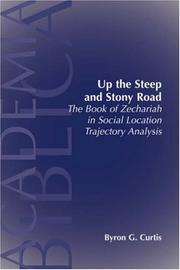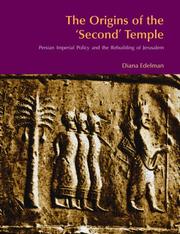| Listing 1 - 4 of 4 |
Sort by
|

ISBN: 1589833244 1429414383 9781429414388 9781589833241 9781589832381 1589832388 Year: 2006 Publisher: Atlanta Society of Biblical Literature
Abstract | Keywords | Export | Availability | Bookmark
 Loading...
Loading...Choose an application
- Reference Manager
- EndNote
- RefWorks (Direct export to RefWorks)
Apocalyptic literature. --- Literature, Apocalyptic --- Literature --- Bible. --- Sacharja (Book of the Old Testament) --- Zacharias (Book of the Old Testament) --- Zechariah (Book of the Old Testament) --- Zekharyah (Book of the Old Testament) --- Criticism, interpretation, etc. --- Authorship.
Book
ISBN: 9781107039742 9781139626507 9781107566163 9781107732063 1107732069 1139626507 1107039746 1107720869 1139893017 1107727952 1107730317 1107723949 110772855X 1107566169 Year: 2013 Volume: 157 Publisher: New York
Abstract | Keywords | Export | Availability | Bookmark
 Loading...
Loading...Choose an application
- Reference Manager
- EndNote
- RefWorks (Direct export to RefWorks)
The author of 1 Peter regards Christian suffering as a necessary feature of faithful allegiance to Jesus, which precedes the full restoration and vindication of God's people. Much previous research has explored only the cause and nature of suffering; Kelly D. Liebengood now addresses the need for an explanation for the source that has generated this particular understanding. If Jesus truly is God's redemptive agent, come to restore His people, how can Christian suffering be a necessary part of discipleship after his coming, death and resurrection, and what led the author of 1 Peter to such a startling conclusion? Liebengood analyzes the appropriation of shepherds, exodus, and fiery trials imagery and argues that the author of 1 Peter is dependent upon the eschatological programme of Zechariah 9-14 for his theology of Christian suffering. This book will interest those studying the New Testament, Petrine theology and early Christianity.
Relation to Peter, 1st. --- Suffering --- Biblical teaching. --- Bible --- Eschatology --- Bible. --- Criticism, interpretation, etc --- Criticism, interpretation, etc. --- Epistle of Peter, 1st --- Peter, 1st (Book of the New Testament) --- Peter (Book 1) --- Sacharja (Book of the Old Testament) --- Zacharias (Book of the Old Testament) --- Zechariah (Book of the Old Testament) --- Zekharyah (Book of the Old Testament) --- Suffering - Biblical teaching.
Book
ISBN: 157506412X 9781575064123 1575064111 9781575064116 9781575064116 Year: 2015 Publisher: Winona Lake, Indiana
Abstract | Keywords | Export | Availability | Bookmark
 Loading...
Loading...Choose an application
- Reference Manager
- EndNote
- RefWorks (Direct export to RefWorks)
"The 4th-century teacher, Didymus the Blind, enjoyed a fruitful life as head of an episcopally-sanctioned school in Alexandria. Author of numerous dogmatic treatises and exegetical works, Didymus was considered a stalwart defender of the Nicene faith in his heyday. He duly attracted the likes of Jerome and Rufinus to his school. Contemporary scholarship has focused most of its attention on understanding him as an exegete, especially focusing on his exegetical vocabulary and the driving assumptions behind his particular method of reading Scripture. The theological literature has been somewhat neglected. In this study, Jonathan Hicks makes the claim that Didymus’s exegesis can only be understood in all its fullness in light of his theological commitments. His acute differences with Theodore of Mopsuestia on the proper reading of the prophet Zechariah cannot be understood as merely methodological. Animating Didymus’s reading of the prophet is a lively understanding of Trinitarian missions. Recognizing the comings of the Son and the Spirit to Israel is essential in locating the prophet’s message properly within the one divine economy of revelation and salvation that culminates in the Incarnation of Christ. Hicks argues that Didymus is instructive here for today’s Church both on the level of praxis (we should adopt some of his reading practices) and on the level of theoria (his Trinitarian account of Scripture’s origin and ends is fundamental to a fully Christian understanding of what Scripture is)."
Trinity --- Holy Spirit --- Didymus, --- Didymus Alexandrinus --- Didymus Caecus Alexandrinus --- Didyme l'aveugle --- Didymus de Blinde --- Didymus van Alexandrie --- Didymus the Blind --- Dídimo, --- Didimo, --- Didyme, --- Didymos, --- Bible. --- Bible --- Sacharja (Book of the Old Testament) --- Zacharias (Book of the Old Testament) --- Zechariah (Book of the Old Testament) --- Zekharyah (Book of the Old Testament) --- Criticism, interpretation, etc. --- History --- Trinity. --- Holy Spirit. --- Theology, Doctrinal --- Triads (Philosophy) --- Appropriation (Christian theology) --- God (Christianity) --- Godhead (Mormon theology) --- Trinities --- Tritheism --- Holy Ghost --- Paraclete --- Pneumatology (Theology) --- Spirit, Holy --- Spirit --- De Trinitate (Didymus, the Blind) --- Peri tou tēn Hagian Triada akatalēpton einai (Didymus, the Blind) --- Divinity of Christ

ISBN: 1315711338 1317491637 1281744972 9786611744977 9781845534837 1845534832 9781317491637 9781281744975 9781845530174 1845530179 9781845530167 1845530160 9781315711331 9781317491613 9781317491620 Year: 2005 Publisher: London Oakville, CT Equinox Pub.
Abstract | Keywords | Export | Availability | Bookmark
 Loading...
Loading...Choose an application
- Reference Manager
- EndNote
- RefWorks (Direct export to RefWorks)
Darius I, King of Persia, claims to have accomplished many deeds in the early years of his reign, but was one of them the rebuilding of the temple in Jerusalem? The editor who added the date to the books of Haggai and Zechariah thought so, and the author of Ezra 1-6 then relied on his dates when writing his account of the rebuilding process. The genealogical information contained in the book of Nehemiah, however, suggests otherwise; it indicates that Zerubbabel and Nehemiah were either contemporaries, or a generation apart in age, not some 65 years apart. Thus, either Zerubabbel and the temple
Artaxerxes I, King of Persia, -425 B.C. or 424 B.C. -- Relations with Jews. --- Bible. Ezra, I-VI -- History of Biblical events. --- Bible. Haggai -- Chronology. --- Bible. Nehemiah -- Chronology. --- Bible. Zechariah -- Chronology. --- Jerusalem -- History -- To 1500. --- Temple of Jerusalem (Jerusalem) -- History. --- Yehud (Persian province). --- Middle East --- Regions & Countries - Asia & the Middle East --- History & Archaeology --- Artaxerxes - I, - King of Persia, - d. 425 or 4 B.C. - Relations with Jews. --- Jerusalem - History - To 1500. --- Yehud (Persian province) --- 933 JERUSALEM --- 933 JERUSALEM Geschiedenis van Palestina en het Joodse volk--JERUSALEM --- Geschiedenis van Palestina en het Joodse volk--JERUSALEM --- Artaxerxes --- Artakhshathra, --- Artaxerxes, --- Relations with Jews. --- Temple of Jerusalem (Jerusalem) --- History. --- Bible. --- Sacharja (Book of the Old Testament) --- Zacharias (Book of the Old Testament) --- Zechariah (Book of the Old Testament) --- Zekharyah (Book of the Old Testament) --- Esdras (Book 2, Vulgate) --- Nehemiah (Book of the Old Testament) --- Neḥemyah (Book of the Old Testament) --- Aga (Book of the Old Testament) --- Aggeus (Book of the Old Testament) --- Haggai (Book of the Old Testament) --- History of Biblical events. --- Chronology. --- Jerusalem --- Ierusalim --- Иерусалим --- Yerushalayim --- Jeruzalem --- Quds --- Ūrushalīm --- Kuds --- Kouds --- Erusaghēm --- Bayt al-Maqdis --- Jeruzsálem --- Jerusalem (Israel) --- Jerusalem (Palestine) --- ʻIriyat Yerushalayim --- Ierousalēm --- Gerusalemme --- Baladīyat al-Quds --- Baladīyat al-Quds al-ʻArabīyah --- Jerusalem Arab Municipality --- Qods (Jerusalem) --- ירושלים --- القدس --- al-Quds --- قدس --- Jerusalén --- History --- Artaxerxes - I, - King of Persia, - d. 425 or 4 B.C.
| Listing 1 - 4 of 4 |
Sort by
|

 Search
Search Feedback
Feedback About UniCat
About UniCat  Help
Help News
News